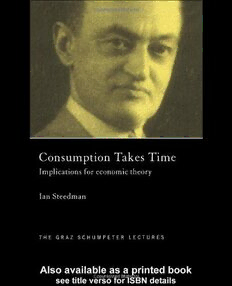Download Consumption Takes Time: Implications for Economic Theory (Graz Schumpeter Lectures, 4) PDF Free - Full Version
Download Consumption Takes Time: Implications for Economic Theory (Graz Schumpeter Lectures, 4) by Ian Steedman in PDF format completely FREE. No registration required, no payment needed. Get instant access to this valuable resource on PDFdrive.to!
About Consumption Takes Time: Implications for Economic Theory (Graz Schumpeter Lectures, 4)
Standard economic theory of consumer behaviour considers consumers' preferences, their incomes and commodity prices to be the determinants of consumption. However, consumption takes time and no consumer has more - or less - than 168 hours per week. This simple fact is almost invisible in standard theory, and takes the centre stage in this book. Whether one is 'money-rich but time-poor' or is 'money-poor and killing time', both money and time considerations matter. Recognition that consumers are subject to both time and expenditure constraints makes a real difference to the economic theory of consumption. 'Two-constraint' theory is genuinely different in various respects from the familiar one-constraint theory. Income effects, substitution effects etc. have to be reconsidered, expenditure functions have to be redefined, and the results are sometimes surprising. It is not only the positive theory of consumption and labour supply that must be reworked, welfare economics too changes significantly when time constraints on consumption are given their proper due. The focus on time not only changes the comparative states of consumer theory, but it also overcomes some of the more artificial barriers between social theory and practical, everyday matters of altruism and interpersonal decision taking.
Detailed Information
| Author: | Ian Steedman |
|---|---|
| Publication Year: | 2001 |
| ISBN: | 9780203552605 |
| Pages: | 130 |
| Language: | English |
| File Size: | 1.669 |
| Format: | |
| Price: | FREE |
Safe & Secure Download - No registration required
Why Choose PDFdrive for Your Free Consumption Takes Time: Implications for Economic Theory (Graz Schumpeter Lectures, 4) Download?
- 100% Free: No hidden fees or subscriptions required for one book every day.
- No Registration: Immediate access is available without creating accounts for one book every day.
- Safe and Secure: Clean downloads without malware or viruses
- Multiple Formats: PDF, MOBI, Mpub,... optimized for all devices
- Educational Resource: Supporting knowledge sharing and learning
Frequently Asked Questions
Is it really free to download Consumption Takes Time: Implications for Economic Theory (Graz Schumpeter Lectures, 4) PDF?
Yes, on https://PDFdrive.to you can download Consumption Takes Time: Implications for Economic Theory (Graz Schumpeter Lectures, 4) by Ian Steedman completely free. We don't require any payment, subscription, or registration to access this PDF file. For 3 books every day.
How can I read Consumption Takes Time: Implications for Economic Theory (Graz Schumpeter Lectures, 4) on my mobile device?
After downloading Consumption Takes Time: Implications for Economic Theory (Graz Schumpeter Lectures, 4) PDF, you can open it with any PDF reader app on your phone or tablet. We recommend using Adobe Acrobat Reader, Apple Books, or Google Play Books for the best reading experience.
Is this the full version of Consumption Takes Time: Implications for Economic Theory (Graz Schumpeter Lectures, 4)?
Yes, this is the complete PDF version of Consumption Takes Time: Implications for Economic Theory (Graz Schumpeter Lectures, 4) by Ian Steedman. You will be able to read the entire content as in the printed version without missing any pages.
Is it legal to download Consumption Takes Time: Implications for Economic Theory (Graz Schumpeter Lectures, 4) PDF for free?
https://PDFdrive.to provides links to free educational resources available online. We do not store any files on our servers. Please be aware of copyright laws in your country before downloading.
The materials shared are intended for research, educational, and personal use in accordance with fair use principles.

